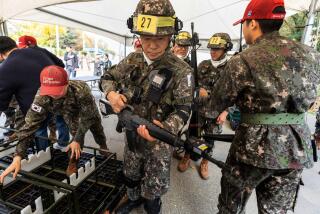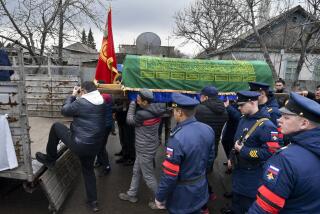Culture : Gurkha Soldiers Losing Battle Against Extinction : Famed for their curved knives and do-or-die spirit, they are bowing to budget cuts and new technology.
- Share via
POKHARA, Nepal — Lance Cpl. H.K. Ghale, a Gurkha soldier, runs his fingertips along the edge of a long, curved sword and explains the art of decapitation. “It must be done in one clean stroke,” he says. “Only a few people can still do it.”
Gurkhas used to bring this skill to war, but Ghale says that he would rather use a gun. As for decapitation, “I can only do a chicken,” he admits.
In fact, Ghale may be part of the last generation of some of the world’s most legendary fighters.
The Gurkha fighting men of Nepal are a colorful legacy of Britain’s colonial era--soldiers whose predecessors fought in battles from Gallipoli to the Falklands. While the British army still makes annual recruiting trips into the Himalayan hills to help fill out its ranks, the Gurkhas’ old-fashioned martial talents may soon be outpaced by modern technology and reduced military budgets.
Whittled away by the empire’s decline, the British army is scaling down. In 1997, Britain will return one of its last colonies--Hong Kong--to China, and the Gurkhas stationed there will move to Britain, their numbers reduced from 5,000 to 2,500.
“It’s the end of an era,” says British army spokesman Arthur Murray. “You saw the technology used in the Gulf War. There’s less of a place for the Gurkhas in modern warfare.”
On a recent autumn day in Hong Kong, machine-gun-toting Gurkhas crawled through the brush during a mock battle. Four British bankers who wandered into the war games during a country walk were taken prisoner and interrogated as “spies.”
Watching the exercises, Murray poked a few holes in the Gurkha myth. “They take twice as long to train as the average British soldier,” he said. “They can’t march--they don’t high-step, they sort of shuffle. They hate water, and of course you have to teach them English.”
Yet, raised on the terraced slopes of the world’s mightiest mountains, the Gurkhas have an age-old reputation as invincible fighters. Their motto: “It’s better to die than be a coward.”
“When they’re ready to go into battle, their eyes turn red,” says an old veteran, Capt. T. B. Gurung, reciting an oft-told legend. “Then they keep coming. They can never be stopped.”
The British discovered the Gurkhas’ ferocity the hard way, in a war in 1814 over territory in northern India, not far from here. The British outnumbered the Gurkhas and won, but they were so impressed by their foes’ fighting spirit that they later incorporated four battalions of Nepalese soldiers into Britain’s East India Co. army.
Since 1815, the Gurkhas have fought alongside the British in colonial conflicts and world wars. In World War II, 250,000 Gurkhas--nearly every man of fighting age in Nepal--joined the British Gurkha regiments fighting in Burma and Italy. Almost 10% of them were killed, but they received more Victoria Crosses--the award for extraordinary valor--tahan any other regiment. The Gurkhas also participated in the Persian Gulf War and in U.N. peacekeeping efforts in Cyprus.
Nepal’s young men still compete to join the Gurkha ranks--the one job in this developing country that promises a decent living and a place in local lore. Recruiting to fill 153 vacancies ended in November; about 45,000 hopefuls showed up.
Lance Cpl. Ghale says late-night stories of a relative, Havildar Gaje Ghale, one of Nepal’s 26 Victoria Cross winners, inspired him to join. While fighting against the Japanese in Burma in World War II, Ghale was wounded in the arms, chest and leg by a grenade, but he went on to kill several enemy soldiers in hand-to-hand combat.
Fleet Street gushed over his accomplishments. “Hurling hand grenades, covered in blood from his own neglected wounds, he led assault after assault, encouraging his platoon by shouting the Gurkha’s battle cry,” the now-defunct London Gazette reported in 1943.
Accounts like this inevitably grow and are woven into myths of Gurkha courage, passed from village to village in Nepal and beyond. In the Falklands conflict, when the news came that a battalion of Gurkhas was on the way to cut heads, many Argentines reportedly surrendered.
Central to the tales is the kukri-- the razor-sharp curved knife every Gurkha keeps tucked in his belt. It doubles as a lethal boomerang.
Lt. Col. Paul Gilham, chief of staff in Katmandu, recalls the legend of the Gurkha who lashed out at an enemy with his kukri.
“Hah! You missed,” the enemy soldier exults.
“Are you sure?” the Gurkha asks. And as the soldier begins to nod his assent, his head falls off.
The legends of the Gurkhas are reinforced during a recruiting season each year, when former soldiers go up into the hills to cull the first batch of candidates.
“It’s a very difficult job,” says Color Sgt. Sing Rab Gurung, who directed hill selection in villages in central Nepal for four years. “I needed 10 recruits; 1,000 came.” Gurung says the physical requirements help with the winnowing. Nepalese are tough but small, and those who don’t stand the minimum 5 feet 3 inches, weigh at least 115 pounds or puff out their chests to 33 inches or more are immediately sent home.
The rest are stripped to their shorts and marked with a number on their chests. Some recruiters mark the boys with secret symbols to keep track of their merits and faults and to heighten the tension and mystery of the proceedings. Then come extensive physical and mental exams and strenuous competitions--running up a mountainside, for example, carrying 125 pounds of rocks on their backs.
“If they already pass the physical test, then I select on my own general knowledge,” says Gurung. “When I was in the army, I knew what it took to be a good soldier. I can look in his eyes and know if he can fight.”
The final, roughly 150 chosen candidates spend another few months learning how to march and bulking up on spicy Gurkha stew and goat meat.
The Gurkhas are trying to modernize along with the rest of the British army. Ghale and his peers may not be able to behead an enemy with one stroke, but some of them have learned to operate satellites and computers. They also bring those skills, as well as their pension money, back to Nepal after they retire. Gurkha-connected income is Nepal’s fourth-largest source of foreign exchange.
Some worry that the Gurkhas may be losing their unique skills. Capt. T. B. Gurung, 65, helped repress the Communist insurgency in Malaya during the 1950s and fought in Borneo. Now he runs a lodge for trekkers at the base of Annapurna, one of the world’s tallest mountains. His small inn boasts tidy rows of marigolds and “24-hour hot running showers.” A former hill recruiter, he thinks today’s soldiers aren’t as good as his comrades in old times.
“In my time, we fought very well in a very difficult war. We went blindly through the jungle, and there were many snakes and elephants and tigers,” he says. “Nowadays, there’s a very good salary, very good accommodation, but the soldiers are not so good.”
But the Gurkhas retain enough of their martial mystique to keep them in high demand after they leave the British forces. The latest fashion in status-conscious Hong Kong is to have a Gurkha bodyguard. Some former soldiers are guarding diamond mines in South Africa and protecting embassies in the Middle East. The Sultan of Brunei has his own personal battalion. Most, though, return to Nepal with their medals and their memories and, with the help of British army resettlement programs, try for a second career. Whole villages of ex-Gurkhas have sprouted on the mountainsides.
“My grandfather was a soldier. My father was a soldier. Of course I am a soldier, “ says Ghale, looking at his kukri. “I don’t have a son yet, but I don’t think he’ll have the chance.”
More to Read
Sign up for Essential California
The most important California stories and recommendations in your inbox every morning.
You may occasionally receive promotional content from the Los Angeles Times.












